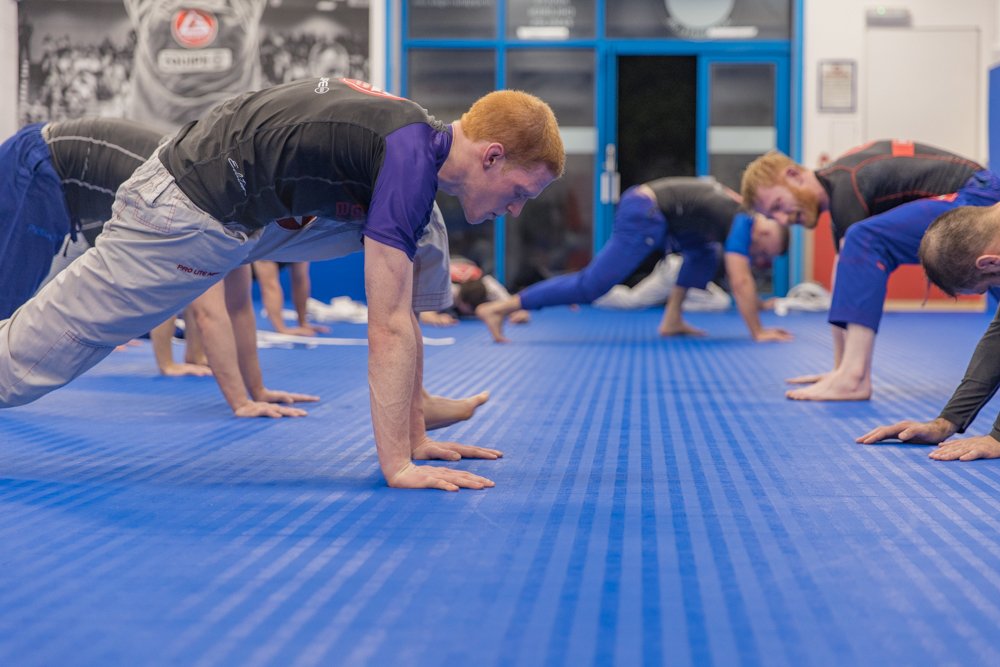Top 5 Injury Prevention Tips for Brazilian Jiu Jitsu
In and out of any sport, injuries can and do happen. Sometimes these may be a small niggle or sprain that resolves quickly, or they can be longer term and require some time away from doing the things that you love. When you’re new to Jiu Jitsu, you may be concerned about injuries and how they might impact you. Although we train in a relatively safe sport with stringent safety procedures in place at the academy, injuries can happen. We want to avoid these as much as possible to allow you to train as much as you like. With that in mind, check out our top 5 injury prevention tips below:
Allow Your Body Time To Adapt
As tempting as it can be to attend as many classes as possible when you first start Jiu Jitsu, it can be really taxing on your joints and muscles. Your body will most likely need time to adapt to the demands that classes offer, particularly heavily utilised joints and muscles.
We suggest attending 3 times a week to maximise your development, but consider your fitness before committing to this or more. This can be built up over time as needed. You may also want to consider a goals meeting with one of our team. Setting a goal that ensures sustainable training can be really beneficial for longevity in the sport. Find out more about goal setting at the club here.
Manage Your Rolls and Output
Brazilian Jiu Jitsu is a competitive sport, so we all want to do our best. That being said, not one roll will make or break your Jiu Jitsu session. Much like it will take your body time to adjust to the sport, you should also consider managing your rolls for longevity. Not every roll demands maximum physical output - especially when rolling with smaller opponents. Tailor your roles accordingly, and leave your ego at the door.
Flow rolls are a popular choice at the academy when you’re recovering from a tough round or session, and they can really improve your connections between positions, giving you time to process mid-roll, before putting these together at a faster pace later on.
Adjust Your Training for Minor Injuries
If you do pick up a small niggle, you may of course opt to rest completely. This is fine, you can return when you see fit. Some of our members will adjust their training to ensure they can still attend class. Let your instructor know before class, and inform training partners before beginning drilling, specific training or rolling. Your instructor can ensure that you are partnered with a higher grade, who will be able to adjust techniques and movements with ease to avoid aggravating your injury.
Of course, this approach is not suitable for all injuries. Severe injuries should be rested and medical assessment should be carried out by a trained professional.
Consider A Strength Training Programme
This is by no means a requirement when you train Brazilian Jiu Jitsu, but research from the British Medical Journal suggests that strength training programmes can reduce sport injuries by 66%. These programmes increase the strength of the muscles, tendons, and even the ligaments and bones. This of course is excellent for Jiu Jitsu, where many joint based submissions can put repeated strain on our ligaments, and training can quickly fatigue our muscles.
Many workouts can be found for free online and can be done at home. Alternatively, many can be done in your local gym if you have an existing membership, or with Everyday Strength here at the academy. Take this further by working on your mobility outside of class warm ups and cool downs. Yoga and pilates are great options to improve flexibility, aid recovery and prevent injuries.
Prevent Injury Recurrence with a Comprehensive Rehab Programme
When injuries do happen, don’t panic and return to training too quickly. Whilst we all want to train and learn, it’s important to give our bodies time to recover. If you believe your injury is serious, always seek medical assistance and follow the rehabilitation plan and timeframes that they provide.
As mentioned above, be sure to inform your instructor before class begins that you’re recovering from an injury should you be able to begin light training again. Consider open mat sessions where you’ll be able to work techniques and movements that won’t further aggravate your injury, and ensure you’re fully recovered before undertaking all aspects of the class again.
There are numerous physios available around Harrogate, some of whom train here at the academy. Be sure you feel confident to train before restarting classes.



